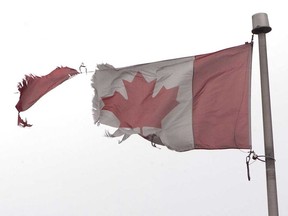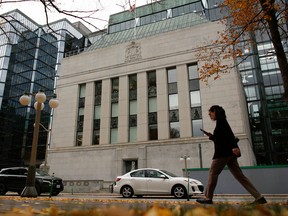Economy could already be in recession, putting an end to rate hikes
Article content
The Canadian economy could already be in a “modest” recession, one economist says, after Statistics Canada released the latest GDP numbers for August and a preliminary forecast for September and the third quarter.
Gross domestic product in August was unchanged, Statistics Canada reported on Oct. 31, mirroring GDP in July and missing analyst estimates for a month-over-month uptick of 0.1 per cent.
Advertisement 2
Article content
Article content
The national data agency also released a preliminary forecast for September of flat GDP.
Based on the data so far, Stephen Brown, deputy chief North America economist at Capital Economics, estimated that third-quarter GDP contracted 0.1 per cent. That, coupled with the pullback in growth in the second quarter of 0.2 per cent would meet the technical definition for a recession — two consecutive quarters of contraction.
Other economists including Brown said it is still possible the economy could avoid a contraction in the third quarter.
“But with the Bank of Canada’s recent Business Outlook Survey and the October CFIB Business Barometer both now consistent with negative GDP growth, it seems more likely that the modest recession we are forecasting has now begun,” Brown said.
The latest data should give the Bank of Canada another reason to end its rate hiking campaign, say economists.
“This is yet one more crystal clear sign that the Bank of Canada should be done hiking,” said Benjamin Reitzes, economist at BMO Economics.
Here’s what economists believe the latest GDP numbers mean for the economy, the Bank of Canada and interest rates.
Article content
Advertisement 3
Article content
Andrew Grantham, CIBC Economics
“The Canadian economy is already skirting a recession, with preliminary industry data for Q3 suggesting the possibility of a further slight contraction in activity to follow Q2’s surprise decline. For Q3 as a whole, GDP was also essentially unchanged. That’s much weaker than the Bank of Canada’s MPR (Monetary Pollicy Report) forecast of 0.8 per cent annualized growth, although it should be noted that there is often a discrepancy between the industry figures released today and the later expenditure data. Still, the fact that the economy appears close to tipping into a mild recession already clearly reduces the likelihood of any further interest rate hikes, and will likely see financial markets pulling forward expectations for rate cuts which will weigh on the Canadian dollar.”
Stephen Brown, Capital Economics
“The key thing to watch for now are signs that the modest recession could morph into a deeper one, for example due to stress in the housing market or because the labour market weakens by more than we anticipate. We forecast a five per cent fall in house prices over the next six months and assume that some degree of labour hoarding will result in just one full quarter of employment losses. if either of those assumptions proves too optimistic, then GDP would likely decline by much more than we have assumed. Either way, the data today reinforce our view that the bank will begin to cut interest rates sooner than markets are pricing in.”
Advertisement 4
Article content
Related Stories
-

Canada’s stalling economy on track for technical recession
-

‘Record spike’ in number of immigrants leaving Canada
Marc Ercolao, TD Economics
“Higher interest rates are certainly doing their part to tamp down excess demand, and we continue to expect below-trend growth for the next couple of quarters. After holding the policy rate at five per cent last week, the Bank of Canada should feel confident that their rate hikes are working to pull the economy back into balance. That said, they have voiced their need to remain vigilant, especially as core inflation remains at uncomfortable levels. Employment and wages data later this week will be on watch, as this segment of the economy continues to show relative strength.”
Benjamin Reitzes, BMO Economics
“This is yet one more crystal clear sign that the Bank of Canada should be done hiking. The potential for a second consecutive negative quarterly GDP reading will cause recession chatter to ramp up quickly. The soft economic backdrop, which still has downside, will drive inflation down over time … it’s just a question of how quickly.”
Advertisement 5
Article content
Jay Zhao-Murray, currency analyst, Monex Canada
“With evidence from the Bank of Canada’s consumer and business surveys indicating that discretionary spending, hiring intentions, and investment intentions are only set to decline further, we anticipate that the economy will enter a somewhat more pronounced recession around the start of 2024, which would put pressure on the Bank of Canada to begin cutting rates before the (United States) Federal Reserve. While we do expect core inflation pressures to subside as growth sours further, the risk of stagflation is nevertheless real. In such an environment, the Bank of Canada may still hike once more, but it would only raise the odds of a more severe downturn.”
• Email: gmvsuhanic@postmedia.com
Bookmark our website and support our journalism: Don’t miss the business news you need to know — add financialpost.com to your bookmarks and sign up for our newsletters here.
Article content
What GDP is telling the Bank of Canada: economists
2023-10-31 14:41:54







Comments
Postmedia is committed to maintaining a lively but civil forum for discussion and encourage all readers to share their views on our articles. Comments may take up to an hour for moderation before appearing on the site. We ask you to keep your comments relevant and respectful. We have enabled email notifications—you will now receive an email if you receive a reply to your comment, there is an update to a comment thread you follow or if a user you follow comments. Visit our Community Guidelines for more information and details on how to adjust your email settings.